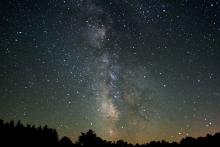Here's what we did week 1:
- It gets cold at night, and observing is not a physically strenuous activity, so you need to dress more warmly than you think!
- You should have snacks and drinks when observing. Stay hydrated.
- Keep a first aid kit handy. Use insect repellant when necessary.
- NEVER look directly at the sun with a telescope or binoculars! You can either use the telescope to project an image of the sun onto a piece of paper, or use an approved solar observing filter that coveres the entire front of the telescoep or binoculars!
- To observe objects near the sun safely the sun must be blocked. The best way would be to look just after sunset or before sunrise.
- Light pollution is unwanted or unneeded light. It happens when people shine lights where they are not doing any good (like at the sky). Aside from wasting energy, it can adversely affect wildlife and people's health. Light pollution can drown out the stars. Air pollution also makes it difficult to see by causing clouds or by reflecting ground lights more.
- We talked about the 3 different kinds of optical telescopes:
1. refractor - lens
2. reflector - mirror
3. catadioptric - lens + mirror
As well as other kinds (radio telescopes, solar telescopes, X ray telescopes).
- We talked about 3 different kinds of astronomical instruments:
1. camera - records images
2. spectroscope - records colors of light, which can tell us what a star is made of and how it is moving
3. interferometer - lets us combine light from multiple telescopes to find more detailed information than we can with a single telescope.

